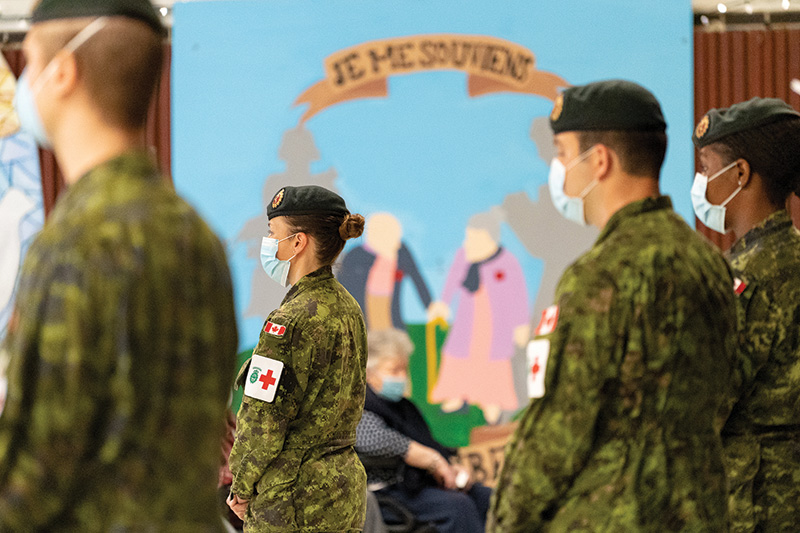
DND photo by Corporal Ene, 2nd Division Public Affairs.
Captain Isabelle Dubé from 41 Health Services Centre leads her personnel during a farewell parade performed at Ste. Anne’s Hospital during Operation LASER in Sainte-Anne-de-Bellevue, Quebec, 17 May 2020.
Nothing tests a leader like a crisis! Anxiety, insecurity, and confusion are the key ingredients to any crises and can quickly become a challenge to all levels of leadership. The Canadian Armed Forces’ (CAF) single peacetime focus is to prepare itself for combat, which is the ultimate crises. Through these challenging times we have learned that when basic physiological and security needs are threatened, people feel emotions of fear, anxiety, anger, and confusion. These emotions can paralyze people and a nation from doing what it needs to do most, which is to think and to act.
In 2021, I can’t help but reflect on the personal challenges we face as individuals and as a nation. Navigating the chaos of living and working with COVID-19 has required leaders in every rank to demonstrate fighting spirit, which enables us to have the morale, physical, and intellectual ability to endure hardship, operate in dangerous conditions, and to take on our duties with confidence and tenacity.Footnote 1 Leaders have an enormous responsibility; as key enablers and change agents we exercise great influence over our organizations, and each of us, no matter who we are, have the opportunity to shape and alter the environment in which we are operating. I remain inspired by the acts of courage, honour, selflessness, loyalty, and many other positive behaviours that have been demonstrated across our institution.
As the crisis began, military leaders stepped up; adrenaline and coffee drove those first hours, days, and months as the need to absorb, interpret, and disseminate vast amounts of military information to a dispersed workforce challenged every chain of command. Leaders everywhere scrambled to deliver the first message. The first message needed to come from a credible source: accurate, consistent, and timely information is crucial. Get it wrong and many might disregard the message and seek alternate sources to either confirm or disconfirm their personal beliefs.
We learned that during crisis, practices are turbulent, and an individual’s interest is often at odds with collective interests. In an age where information is just a click away, we discovered that information anxiety can not only affect the troops but impact leaders as well. For some it was not about having access to enough information and for others it was having too much. Wurman, an expert in information conception, defined information anxiety as:
the state produced by the ever-widening gap between what we understand and what we think we should understand. It is the black hole between data and knowledge, and it happens when information doesn’t tell us what we want or need to know.Footnote 2
But what happens to a leader when self-efficacy is interrupted and replaced by moments of hopelessness and mental fog. I, too, feel the weight of leadership on my shoulders and mind, as the COVID-19 crisis passed the 19th month, feeling emotions of exhaustion, anger, frustration, and hopelessness are natural. The truth is, every person has a breaking point, even the most successful leaders. As leaders, we need to set the example for others and ensure we recognize our own welfare. As General Patton once explained: know when to move and when to rest; “you cannot afford to squander precious resources on creating the mere appearance of non-stop productivity.”Footnote 3
Put your oxygen mask on first, before assisting others.
As an authentic leader, we need to be self-aware, remain true to ourselves and maintain our values even in times of great stress. Remember, as we have all heard before, put your oxygen mask on first, before assisting others. Since leadership is about people and relationships, improving our emotional intelligence (EI) will play a vital role in how we lead authentically and navigate the second wave of this pandemic. If we do not understand our own emotions, we might unintentionally transfer those emotions to others.
The framework for EI was first explained by Peter Salovey and John D. Mayer; quite simply it is the ability to recognize your feelings and those of others.Footnote 4 Daniel Goleman agreed and went on to argue that EI was more important than IQ for achieving success in life, business, and career.Footnote 5
The four domains of emotional intelligence are (a) self-awareness: do I recognize my own emotions? (b) self-management: can I manage my emotions? (c) creating a positive outcome; and (d) social awareness: do I recognize others’ emotions and relationship management; can I manage the interaction I have with others constructively and achieve a positive outcome?Footnote 6
To put it succinctly, self-awareness and self-management are about how we manage ourselves, and social awareness and relationship management are how we manage our relationships with others.
Self-Awareness
Self-awareness is the foundation of EI. While our emotions impact our behaviour, performance and relationships with people, being self-aware allows us to be more effective and confident. Simply put, self-awareness drives our moral compass. This is important, given that all leaders have emotional leakage; we need to understand how our emotions impact those around us;. Therefore, a leader’s emotions always have public consequences.Footnote 7
If you want to be a successful leader in your organization, the first person you need to be conversant with is yourself!
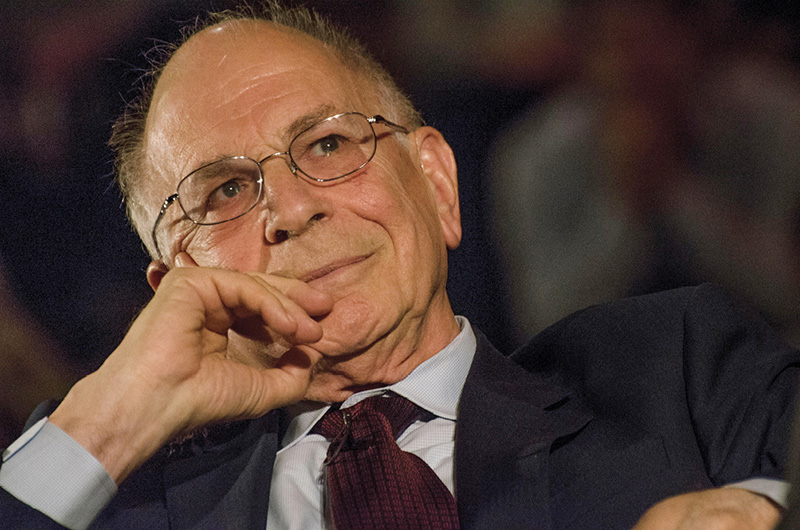
Roger Parkes/Alamy Stock Photo
Nobel Prize winner Daniel Kahneman.
So how do you know if you are a self-aware leader? Self-aware leaders possess knowledge of themselves and are not scared to share their emotions with others, they are attuned to how they are feeling, recognize their own limitations and are not afraid to poke fun at themselves or use humour. They welcome constructive feedback and are always looking for ways to self-improve. Being self-aware provides the power to change behaviour and improve decision making. Cognitive priming – a concept described in detail by psychologist Daniel Kahnemann – explained that the gap between relating to a situation you have never experienced, and relating to the same situation after just a few minutes of reflection, is enormous.Footnote 8 If you want to be a successful leader in your organization, the first person you need to be conversant with is yourself! An excellent tool to increase your self-awareness is journaling; keeping a diary of how you are feeling, where you are, what you were doing or thinking about can help you better understand your own emotions. I have found that making space for ongoing reflective practice and combining it with a walk or a run for an added fitness benefit can reduce stress and improve your leadership skills. Reflecting on our emotions when we are not pressed for time allows us to act more efficiently in times of stress. Remember, leaders always provide the energy! “Emotions are contagious, your team will take their cues from you, both the good and the bad.”Footnote 9
Self-Management
The best gift you can give your followers is your own state of mind.
The COVID-19 pandemic has certainly challenged leaders to manage their emotions in order to continue to operate during stressful times. Leaders require cognitive resilience or the ability to overcome stressful situations to cope with the current environment. Having the ability to self-manage one’s emotions promotes resiliency and enhances perseverance when confronted by obstacles. The best gift you can give your followers is your own state of mind. Merete Wedell-Wedellsborg labelled it as having a “battle mind” or the mental robustness and belief in your own abilities that enables a soldier to withstand fear, absorb strong emotions, and still react quickly.Footnote 10
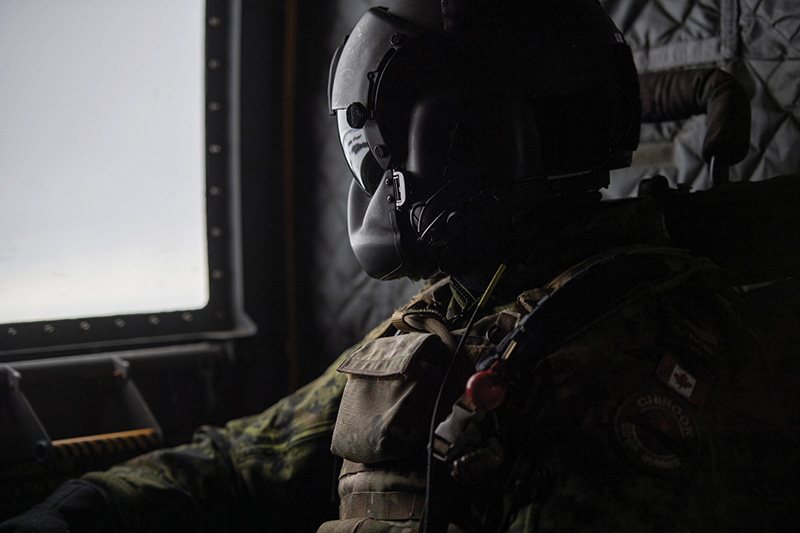
DND photo by Corporal Matthieu Racette
A CH-147 Chinook aircrew member observes while in flight over northern Manitoba during Operation VECTOR, 10 April 2021.
Emotional regulation strategies can be divided into two broad categories: antecedent-focused which occurs before the initiation of an emotional response, and response-focused which occurs after an emotion is already present.Footnote 11 When a person learns to recognize their emotional responses, they can attempt to avoid the situation that elicits the negative response. It is of course unrealistic to expect leaders to avoid all situations that provoke negative emotions, especially in a military context, whereby soldiers are expected to perform under all conditions. A better strategy might be to attempt to modify the situation to incite an emotional response that is more manageable.
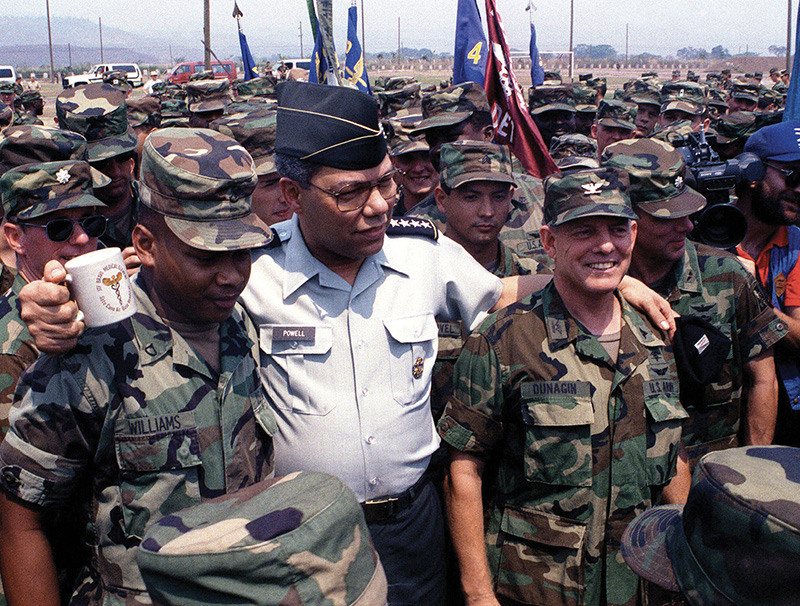
The Color Archives/Alamy Stock Photo
General Colin Powell, chairman, Joint Chiefs of Staff, poses for a photograph with soldiers from Joint Task Force B. General Powel was visiting Honduras as part of exercise FUERTES CAMINOS ‘91.
Quite often we can modify our situation by recognizing what is important and what isn’t. During a crisis it is important to be aware of the things that steal our energy; we cannot afford to drain our battery on applications of no benefit. Not everything can be a priority. Successful leaders prioritize and sustain the focus on the mission. As a response-focused strategy, I frequently analyze a situation and seek out the hidden opportunities; understanding what opportunities exist helps to suppress negative emotions or can assist in masking them with positive thoughts. Gen (Ret) Colin Powel explained that perpetual optimism is a force multiplier, “believing in yourself, believing in your purpose, believing you will prevail, and demonstrating passion and confidence, if you believe and have prepared your followers they will believe.”Footnote 12
Whenever I ask the question, what is the primary responsibility of leaders? The invariable answer is: they look after people! Duty with Honour noted that “members of the profession must ensure the care and well-being of subordinates.”Footnote 13 I have found that quite often leaders, in the pursuit of looking after people, seek to protect them from discomfort. One consequence of leaders sheltering people from uncomfortable situations is the loss of a knowledge opportunity, reduced resiliency; and sheltering does little to improve self-efficacy. Remember, leadership, like any muscle must be exercised under challenging circumstances for it to grow.
Self-Efficacy
Self-efficacy can be defined as a person’s personal belief in their own abilities and behaviour to address a task or situation and be successful. Bryson noted that a vision of success helps not with predicting the future but with creating it.Footnote 14 Likewise, Bandura found that a strong sense of efficacy enhances human accomplishment and personal well-being. He concluded that people with confidence in their capabilities approached challenging tasks as something to be overcome rather than as threats to be avoided. Such an efficacious outlook produces personal accomplishments, reduces stress, and lowers vulnerability to depression.Footnote 15 Self-efficacy is built on learned experiences, having completed a task to a successful conclusion, seeing others succeed under similar circumstances, learning from others, and through social re-enforcement, having others believe in your abilities. Contrary to a popular movie tagline; failure is always an option! Winston Churchill once said, “Success is measured by your ability to maintain enthusiasm between failures.”Footnote 16 As leaders we need to learn to accept failure in the same way we accept success.
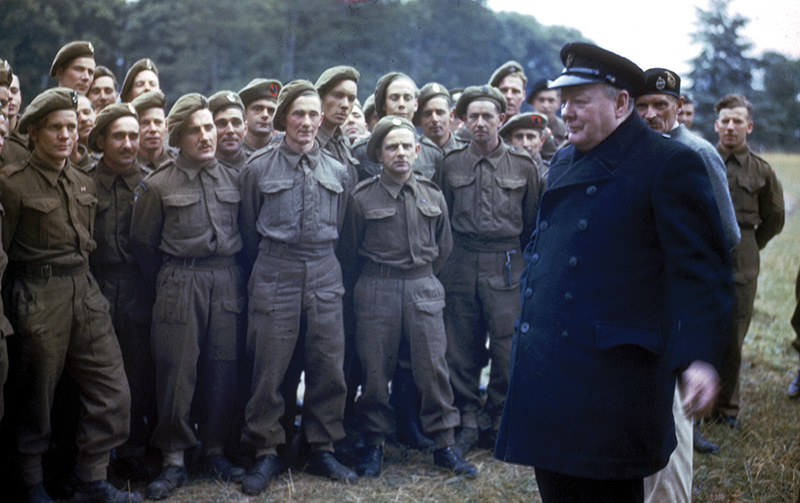
World History Archive/Alamy Stock Photo
Winston Churchill with soldiers in 1942.
Social Awareness
Social Awareness or empathy for others is a critical social competency for leaders. Empathy is not the ability to place yourself in another person’s situation; it is the capacity to actually feel the emotions of others. It is perhaps the most important attribute a leader can possess, because without being attuned to others, it becomes extremely difficult to do what is right or appropriate. Empathetic leaders understand the feelings of others and consider them in their decisions. It is important to note that I am not suggesting decisions should be based solely on emotions or empathy. Decisions need to be balanced; empathy for others is an input in the decision cycle but cannot be the impetus for the decision.
Without social awareness, there are no followers and there are no leaders
Social awareness requires us to be present with others; as a young corporal I remember working on an airplane when the commanding officer walked by and stopped to inquire about what I was fixing. He knelt beside me and asked how my family was doing; he knew my wife, my children’s names, how old they were, and what sports they liked to play. That interaction always stayed with me; I felt valued, special, and connected. Years later I met the Commanding Officer, since retired, and recounted the story to him and I asked how he could have possibly known so much about me and my family. His answer surprised me, but never left me: he wrote everyone’s name in a book, took notes on their family, and every night he studied another person in his organization. The truth is, followers will forget everything you accomplished, but they will never forget how you made them feel. Leadership can only exist through the strength of the relationship.
Leadership can only exist through the strength of the relationship
It is empirically proven that as emotional beings, social isolation has a detrimental effect on all humans. When we are stressed, we tend to focus on our own needs; worry increases and we can perpetuate a cycle of negative emotions that adversely affect ourselves and others. Another means to release our negative energy is to focus our attention on the needs of others.
I have been thoroughly impressed by those women and men in our ranks who demonstrated such strength of character and sought ways to positively influence people. Purpose and meaning are perhaps the strongest contributors to self-worth and mental well-being and there is no greater purpose for a leader than lifting others.
Relationship Management
The final EI ability is relationship management; it is where the triad of self-awareness, self-management, and social awareness are put to work. At the heart of relationship management are soft skills, applying our emotional understanding of ourselves and influencing others through interpersonal communication. To be an effective leader we require the social capacities to communicate vision and inspire confidence in others.
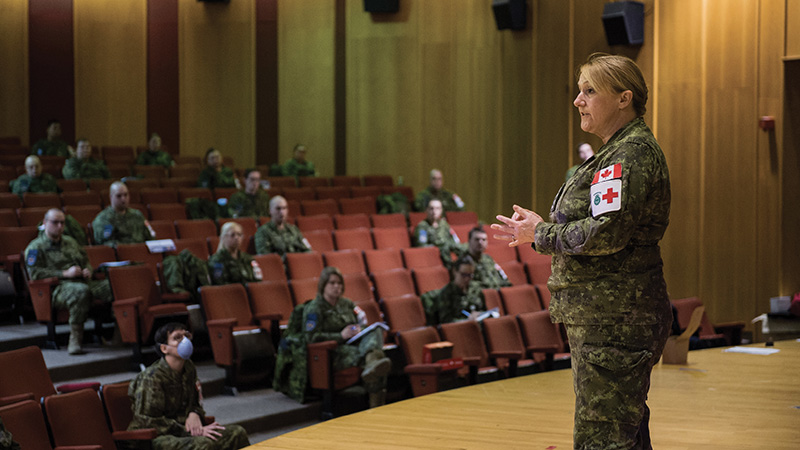
DND photo by Corporal Myki Poirier-Joyal
Colonel Asselin, Commander of 4 Health Services Group (4 H Svcs Gp), explains the conduct of operations to members under her command during Operation LASER at Saint-Jean Garrison, 18 April 2020.
The development of the CAF leadership framework, which outlines the importance of social capacities, defines social capacities as:
a sincere and meaningful behavioural flexibility to be all things to all people, with authenticity, combined with communications skills that clarify understanding, resolve conflicts and bridge differences. These capacities are blended with an interpersonal proficiency of clarity and persuasiveness, team relationships that generate co-ordination, cohesion, trust and commitment, and partnering capabilities for strategic relations building.Footnote 17
The old fallacy of military leadership is that there is no place for emotions or connections and that command and control is the best leadership style. Kouzes and Posner in their inquiry about the leadership characteristics of admired leaders concluded that followers believe the leader must be honest, forward looking, competent, and inspiring.Footnote 18 Conversely, one inquiry about generational differences on desired leadership characteristics noted that today’s millennial and Generation Z soldiers put more emphasis on caring and self-controlled leadership.Footnote 19 The importance of emotional intelligence for successful leadership may never be more relevant than with today’s newest soldiers.
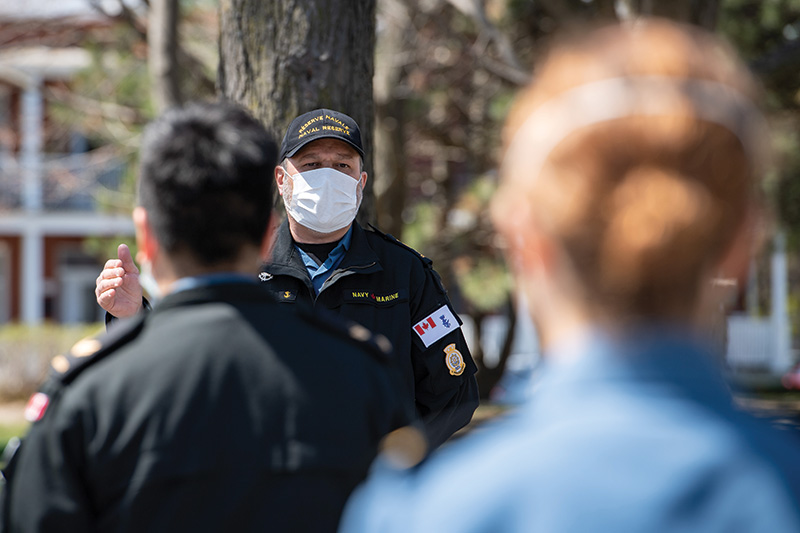
DND photo by Corporal Geneviève Beaulieu
Commander Mathieu Leroux, JTF(E) Maritime Component Commander, and Chief Petty Officer, 1st Class Michel Giguère, Chief Petty Officer of the Naval Reserve Fleet, deliver a few words of encouragement to their personnel during their shift rotation at the Manoir-de-Verdun long-term care center, in Verdun, Quebec, during operation LASER, 3 May 2020.
The modern battlefield during COVID-19 is situated in the domain of relationship management. The pain of isolation, and the everyday toxicity of social threats must be met with a renewed vigor of honest and caring leadership. Each of us share the responsibility to positively influence our environment. Practicing emotional intelligence skills will aid us in understanding and regulating our emotions and influencing the emotions of others. Self-care is important to all of us, so here are a few things to think about in the coming months:
- Take the crisis, one day at a time.
- Keep things in perspective, let go of things you can’t control.
- Take time for reflective practice.
- Believe in yourself!
- Share your feelings; vulnerability always builds trust.
- Set the example with physical fitness.
- Lead with both the heart and the mind.
- Avoid negative people.
- Concentrate on the vision you have for yourself, your family, and finally,
- Recognize the good people in your life and tell them.
“Per Ardua ad Astra”
– RCAF motto (through adversity to the stars)
CWO Daniel Campbell, M.M.M., C.D., M.A. is a Royal Canadian Air Force (RCAF) leader, with a strong interest in leadership and organizational development. He is a graduate of the USAF SNCO Academy in Montgomery, Alabama, and holds a master’s degree in Leadership from Royal Roads University. A former aircraft technician, he has served across Canada and on international operations with Fighter operations and Tactical Aviation. He has held senior non-commissioned positions at the Canadian Forces Leadership and Recruit School, The Canadian Forces School of Aerospace Technology and Engineering, and as 14 Wing Greenwood Wing Chief Warrant Officer. He is currently appointed as the 1 CDN Air Division/Canadian NORAD Region Chief Warrant Officer at RCAF headquarters in Winnipeg, Manitoba.
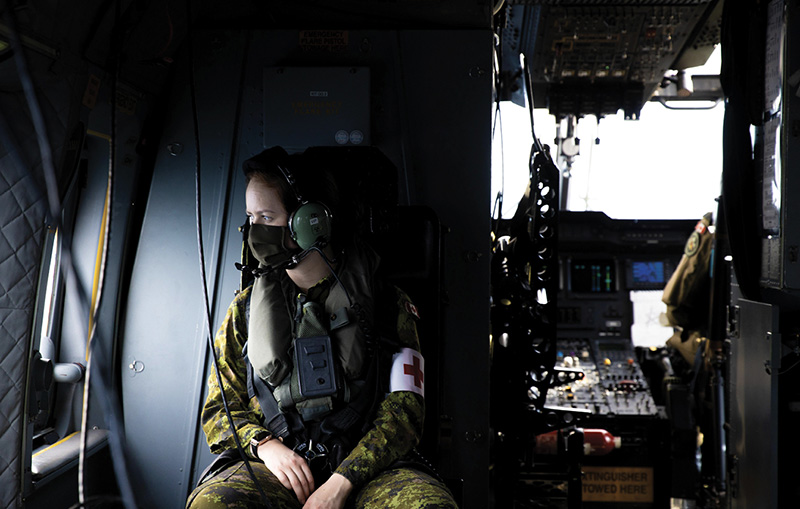
DND photo by Private Daniel Pereira
Corporal Stephanie Patz from 12 (Vancouver) Field Ambulance flies in a CH-149 Cormorant from Vancouver Airport to Victoria Airport, where members will continue on to Quebec, to deploy on Operation LASER, 9 May 2020.